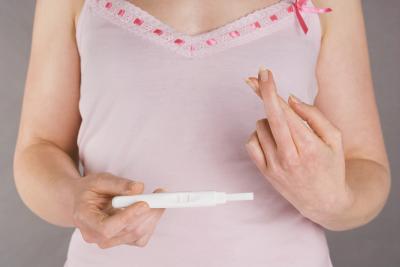Most women want to know as soon as possible whether or not they are pregnant. Home pregnancy tests allow you to find out in the comfort and privacy of your own home. While some tests claim to be able to tell you before you menstruate, pregnancy tests are most accurate when taken a few days after you have missed your first period.
Function
Home pregnancy tests work by detecting a hormone, called human chorionic gonadotropin (hCG), in a pregnant woman’s urine. The hormone production is triggered when the fertilized egg burrows into the uterine lining. Home pregnancy tests contain three different antibodies that react different to the urine, depending on whether or not hCG is present. If hCG is present, the antibodies bond to it, with one of the antibodies triggering an enzyme to produce a dye, which then forms the symbol (or triggers the digital readout) that signifies a positive or negative pregnancy test.
Types
Home pregnancy tests come in two basic types: digital or non-digital. The former have a digital read-out screen that displays the words “pregnant” or “non-pregnant.” Non-digital tests display a symbol such as a “plus” sign or two lines. Home pregnancy tests can also differ in how they are used. Some tests require part of the test to be immersed in a cup of urine, while others instruct the woman to urinate directly on the test.
Time Frame
Some pregnancy tests claim that they will return an accurate result as soon as the first day of a missed period, or even before. The more sensitive a test is, the earlier it can detect the pregnancy hormone. A study done by the University of New Mexico found that First Response Early Result was the most accurate when testing on the first day of a missed period. The brand was found to accurately predict 95 percent of all pregnancies on the day menstruation was expected.
Accuracy
The amount of the hormone present in the woman’s body increases rapidly in the first few days of pregnancy, according to the University of Michigan Health Systems website. For this reason, the longer a woman waits to use a home pregnancy test, the more accurate the results will be. Accuracy can also be increased by testing first thing in the morning, when the urine will be more concentrated. Most home pregnancy tests are 97 to 99 percent accurate if used correctly.
Considerations
Sometimes, the results of a home pregnancy test are not clear or reliable. False positives are uncommon, but they do happen. They usually occur as the result of a “chemical” pregnancy (when an egg implants but fails to develop) or a miscarriage. False negatives can occur when a woman tests too early or does not correctly follow the directions on the test.





